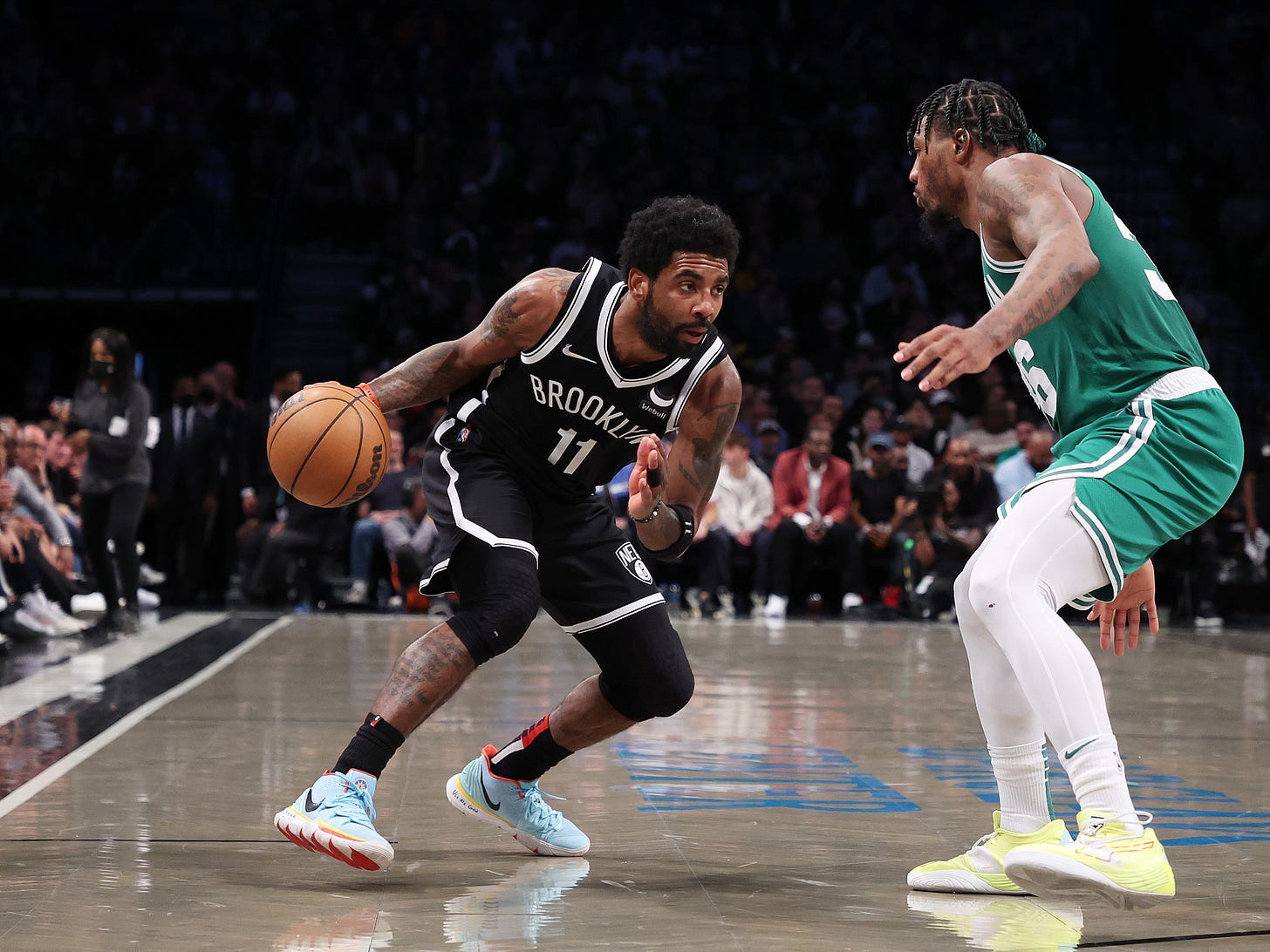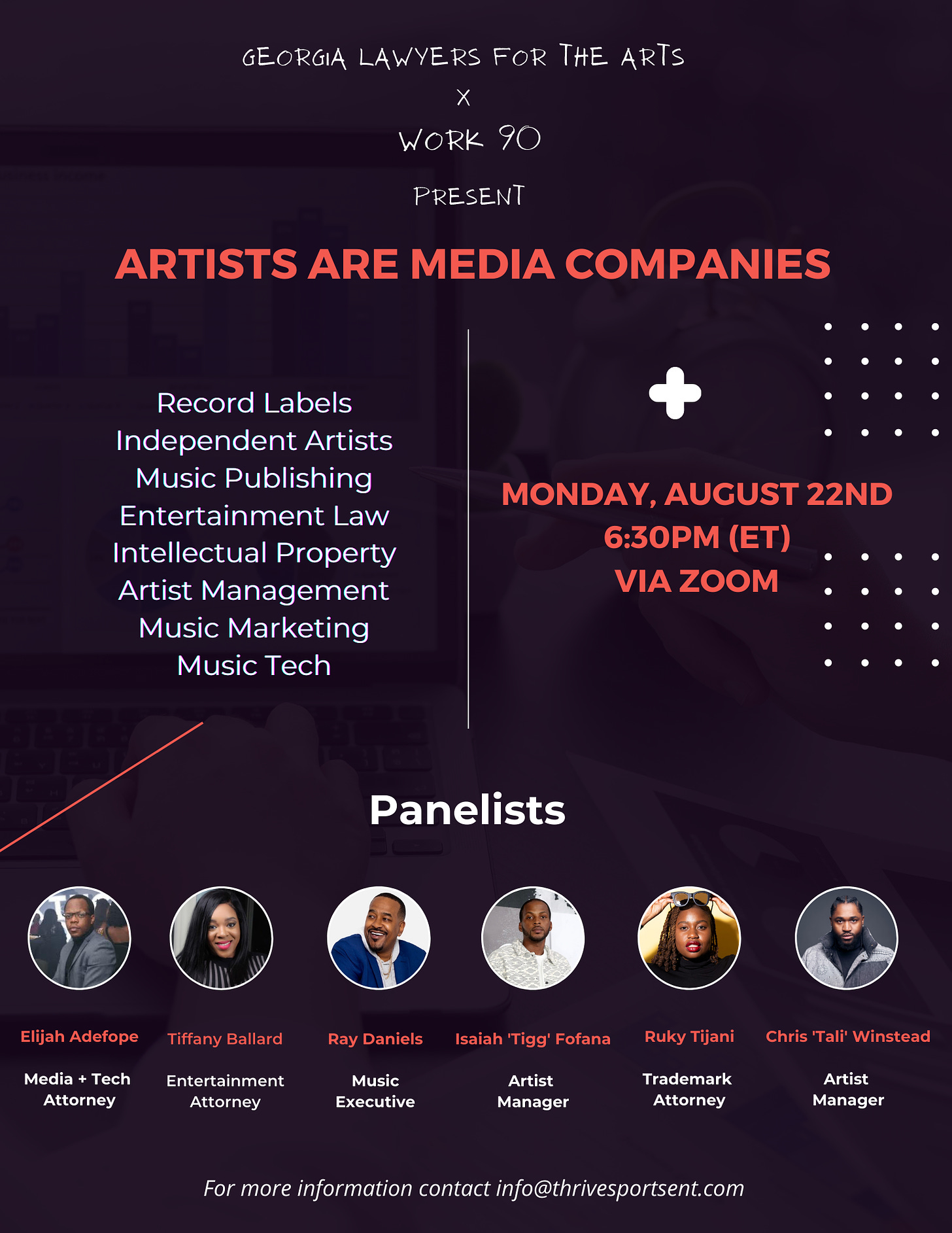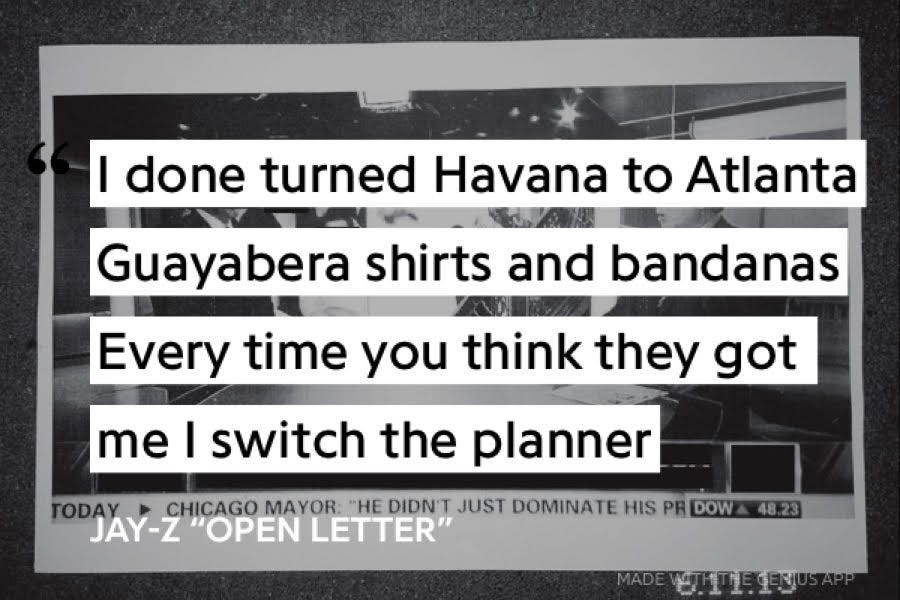A quick note before I get into this article. On August 22nd, 2022 , I’ll be hosting a web seminar in association with ‘Georgia Lawyers for the Arts’; along side a few reputable music industry and legal professionals.
Collectively, this group has represented, negotiated with, and worked for Fortune 500 Companies, major record labels, major music publishing companies, and multi-platinum artists, writers, and producers.
You can find more details, as well as the registration link here.
The seminar is entitled ‘Artists are Media Companies’ because I believe there is much untapped potential available for many recording artists, writers, and producers in the music business. I’ve written about it at length, and it’s an area I’ll continue to explore; but this article is about a wider concept.
The purpose of this article is to set the stage that, truly, we are all artists.
Society, at-large, doesn’t always think that way; and instead, often only, considers those in the traditional music, film, theatrical, and design sectors as artists. This may include singers, musicians, producers, painters, writers, actors, etc.; but I believe we’ve entered a new renaissance age where there is an increasing awakening to the truth that we’re all artists.
Most recently, this has been defined as the ‘Creator Economy’ and, depending on your source, the ‘Creator Economy’ been valued at up to $100 billion. Simply put, the ‘Creator Economy’ refers to the economic sector which houses professionals enabled by emergent social media, marketing, and e-commerce technologies to create direct-to-consumer relationships; thereby, monetizing their businesses and brands in ways previously unavailable to them.
These professionals include not only musicians and other “traditional artists”, but also lawyers, doctors, engineers, business consultants; and even athletes (among others).
BORN TO CREATE
It’s interesting to watch, in real time, the evolution of human capital and traditional commerce; as well as the inevitable friction between the old and new guard(s) of industry, as professionals, in various economic sectors, endeavor to exert more control over their craft(s) and livelihood(s).
Notably, in sports, one athlete that has sought to exert this type of control and self-direction is, NBA player, Kyrie Irving who has received much criticism for his actions and philosophies.
“It’s about on the court, look at my resume, look at the classics, look at my art. I created it for going on 10-plus years now. Don’t play with me”
Kyrie Irving
Regardless of anyone’s opinion, right or wrong, on Kyrie Irving - one incontestable truth is that we are in a new age; one where professionals, of all types, now have an increased opportunity to connect with, and attract, large sums of supporters and consumers. With this increased ability comes increased leverage. This leverage endows professionals with increased levels of economic, and often political, power to exercise in the direction of their aims.
We’ve seen athletes and musicians, such as Lebron James and Chance the Rapper, wield this power to create schools focused on enriching the lives of children in their home communities; and trans-Atlantic commercial endeavors aimed at improving international relations and collaborations.
Endeavors such as these are not new and have been exercised for centuries, particularly by global conglomerates. More recent, and sanitized, examples include the NFL’s creation of football camps in Ghana aimed at growing its fan base, and potentially assisting in the development of a Ghanian / American talent pipeline; and the NBA’s creation of an African basketball league. What is new is that, thanks to the internet, talented individuals with widespread influence have greater access to the information, finances, business networks, and untapped consumer bases needed to compete, and potentially rival, the feats of global conglomerates.
“It's the same old story, different occasion
Nigerian, Ghanaian, Jamaican
Ugandan, Congolese and the Bajan
You can be a star or you can end up a patient”Skepta, ‘Dimension’
A few real-life examples of the ‘Creator Economy’ opportunity seized by professionals include:
Teri Ijeoma, a former Assistant Principal, who quit her job and created a ‘Trade and Travel’ e-course on ‘Teachable’, becoming their top creator by earning over $10 million from her e-course.
Richard Rushfield and Janice Min, a media journalist and media executive, who are the co-owners of ‘The Ankler’ - a Hollywood news - focused newsletter; which uses Substack to facilitate its direct-to-consumer subscription relationships. Rushfield and Min recently raised a $1.5 million seed round, with a corporate valuation of $20m, for their media company - ‘Ankler Media’.
Tyler Toney, Cory and Coby Cotton, Garrett Hilbert, and Cody Jones, former college roommates at Texas A&M University who started ‘Dude Perfect’, a sports and comedy platform. Their YouTube channel has over 57 million subscribers and is the second most-subscribed sports channel. Their company is estimated to be worth $80 million and pulls in an estimated $12 to $15 million annually. The group has also diversified into television with their shows available on CMT, Nickelodeon, Apple TV, and Amazon Prime.
There are numerous other examples of everyday professionals who have capitalized on their talent, skill, and ingenuity by creating media platforms. Granted, creating a million dollar media company is easier said than done; it may not be everyone’s calling, and not much in life is a given - most things must be earned - but my position remains the same: artists are media companies and we are all artists.
“Making money is art, and working is art, and good business is the best art”
Andy Warhol
WHO’S THE ARTIST?
This is why I wrote this article. As a former, private-practicing, entertainment attorney - I’ve always had difficulty accepting the general perspective when it came to recording artists and athletes.
I remember being in law school and interviewing at a sports agency. At the end of the interview I asked the sports agent a question. Our exchange went something like this:
ME: Do you consider that if you do everything for these guys, by the time their career ends, they may not know how to do anything for themselves; and may be worse off because they never developed the required life and business skills?
AGENT: Yeah.. we discuss it internally; but if we don’t do these things, it becomes difficult for us to prove our value.
Needless to say, I didn’t get the job - but that exchange has always stuck with me and has informed my mindset towards the concepts discussed in this article.
See, we all start off as kids, we go to school, we study the same things, we graduate high school, and some of us go to college. Throughout that time, we all begin to show elements of gifting in distinct areas - but, as students (depending on your district), we’re all exposed to the same basic level of information; and are expected to maintain a standard level of competency in core areas.
Some of us may become bankers, some may become engineers, and some may become teachers. Others may start plumbing, construction, or delivery services. Others may open up daycares or bakeries; but we were, generally, all exposed to a basic level of information.
For those who enter the workforce, we are aware that in each profession there are legal, financial (tax), and administrative obligations required of us. It doesn’t matter whether you start a plumbing business or a law firm - you should know that you are operating a business which will require you to gain and develop certain administrative skill sets; or at the very least, you will be required to hire someone who can manage those administrative duties for you while you oversee these tasks.
Now, it’s true that not every business owner is as prudent as they should be; and that most businesses, in fact, fail - but the general societal expectations of these more traditional businesses and professions are much higher than those of entrepreneurs in the music, entertainment, sports, and art sectors. Simply put, even though those musicians, singers, athletes, and painters went to the same highschools as the bankers, financial analysts, and doctors - many don’t think that a singer should be as financially aware as a doctor or a lawyer. As I’ve alluded to, many lawyers are actually terrible when it comes to business administration and finances; but, in my experience, most people expect the singer to be less business savvy than the small business owner - and often implicitly encourage it - even though the singer is, in fact, a small business owner.
This shouldn’t be the case.. and it’s the sort of thing that led Jay Z to once state, “the greatest trick the music industry played was convincing artists that they couldn’t be artists and make money”.
Singers, musicians, writers, and painters are not some sort of endangered mythical creature who are only able to produce “art”, but incapable of understanding basic business concepts. They are human beings like the rest of us with areas of strengths and other areas where they may be more limited; but they, generally, have the same capacity to build strong careers, businesses, and business teams as the rest of us.
Likewise, those of use who may not sing, nor perform on a stage, are not drones void of inspiration and imagination. We, too, are artists in our own right.
As William Shakespeare once declared:
“All the world's a stage
And all the men and women merely players
They have their exits and their entrances
And one man in his time plays many parts”
It is the extreme bifurcation between art and commerce that often creates disillusion for “traditional artists” (singers, painters, writers; etc), and frustration for the so-called “non-artists” - because if you’re not exposed to the right information, as a singer, you will over-index on your “art” to the detriment of your business. Likewise, as a doctor, if you don’t tap into the reality that you are an artist and a creative - you may fall into a rut simply because you did not instill, into your practice, a creative element based on your unique and individual persona and imagination.
In my view, the doctor is as much an artist as the rapper - and it’s this artistic element and passion which creates joy in our lives and prevents mediocrity in our work.
It’s the Warren Buffett Effect. Or as he said - this is what makes him “tap dance to work”; and, inevitably, achieve high levels of commercial success.
There’s a scripture which says, “we are God’s masterpiece”. The word “masterpiece”, in Greek, means “something that is made, constructed, crafted, or performed”. A masterpiece is, in essence, a created work. And as created works, made in the image of a creator, we were born to create.
“It ain't hard to tell
I'm the new Jean Michel
Surrounded by Warhols
My whole team ball”Jay Z, ‘Picasso Baby’
In order to fully actualize our potential, we must bring that same level of creativity to our work.
It’s like Pablo Picasso said, “all children are born artists, the problem is to remain an artist as we grow up”.
It’s often our families, friends, society, and societal institutions which beat the artist out of us - but, by reconnecting with our “inner artist”, perhaps we can achieve higher levels of commercial success in today’s ‘Creator Economy’ and actualize the truth that
We are all artists.
Elijah Adefope is a media, entertainment, and technology consultant and attorney. He is Lead Counsel at Substack, a media technology platform for creatives, and has written two books on the music and sports industries. He lives in Atlanta, Georgia and can be reached on LinkedIn or at elijah@thrivesportsent.com






